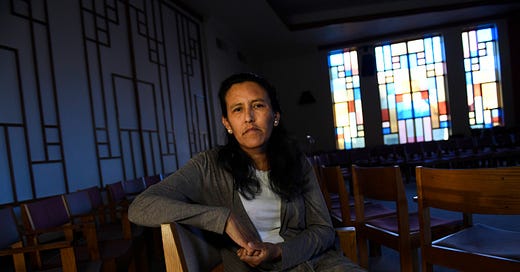Documentary About Life After Deportation, Jeanette Vizguerra Leaves Sanctuary After 4 Years
Happy New Year! 🎉 After a two-week sabbatical from writing, we’re back with another Monday immigration newsletter, including two stories and one guide to doing the somewhat complicated new math on representation rates for people enrolled in the Migrant Protection Protocols.
In addition to these stories, I have two announcements to share. First, I’m excited to have begun work on a “crimmigration”-related grant with my colleagues at TRAC that will allow us to examine the intersection of the criminal justice system and the immigration enforcement system. I will be writing more about that soon, so stay tuned if that is of interest to you. Second, I have received several emails from reporters and colleagues asking about TRAC’s analysis of the EOIR’s “dedicated docket”. TRAC is working on an updated report, which should be out soon.
Today’s Newsletter Includes
“Dial Home” – A Documentary about Life After Deportation ☎️
Jeanette Vizguerra Leaves Sanctuary Church After Nearly Four Years ⛪️
“Dial Home” – A Documentary about Life After Deportation ☎️
An excellent new short documentary by César Martínez Barba looks at the lives of people who have been deported from the United States to Mexico and end up working in call centers that service customers in the United States. Call centers along the US-Mexico border are a quintessential symbol of the contradictions between migration controls and globalization that is often characterized as easing the flow of goods and services but limiting the flow of people.
Many of the people in the documentary spent most of their childhoods in the United States, speak better English than Spanish, and are familiar with US consumer norms and habits — all of which make them ideal candidates to work in call centers for far less than companies are willing to pay in the United States. Added to this is the fact that deportation itself displaces people, upends their lives, and puts them in a situation where they may be willing to accept more exploitative working conditions, or simply have no choice.
An article by Amado Alarcón and Josiah Heyman called “Bilingual call centers at the US-Mexico border: Location and linguistic markers of exploitability” explored this phenomenon. Even though the LA Times described call centers in Tijuana as a “lifeline” for immigrants who have been deported (which I’m not saying is entirely inaccurate), Alarcón and Heyman ultimately take a more critical view. Among their many observations, they show how call centers rely on the expendability of bilingual laborers, particularly after those same people have been expelled by the United States. Here’s how they put it:
“Bilingualism is used in the labor market as a sign of cheap and flexible labor, rather than as economically and socially valued skill, even though in the new information workplace it serves the latter role.”
The documentary provides an important first-person perspective without any political commentary, which means it could be a useful resource to use in class or to share with people who might be otherwise turned off by the politicization of immigration. You can watch the video for free on YouTube here.
Jeanette Vizguerra Leaves Sanctuary Church After Nearly Four Years ⛪️
After nearly four years in sanctuary, Jeanette Vizguerra was finally granted relief from deportation by the Biden administration at the end of December which allowed her to leave the church in Denver, Colorado where she had been living. In February 2017, Jeanette Vizguerra, a mother of four and a leader in the immigrant and labor movements in Colorado, entered sanctuary in the First Unitarian Society of Denver as part of a wider sanctuary church movement during the Trump administration. Jeanette Vizguerra was named one of Time’s 100 most influential people in 2017, where she was described in this way:
“Jeanette moved to the U.S. to be a janitor, working as an outspoken union organizer and building her own company before becoming an advocate for immigration reform—a bold and risky thing for an undocumented immigrant. After fighting off deportation for eight years, she decided to go public with her story and sought refuge in the basement of a Denver church.”
THANK YOU FOR READING! 🙏🏼
If you found this information useful, help more people see it by clicking the ☼LIKE☼ ☼SHARE☼ button below.




